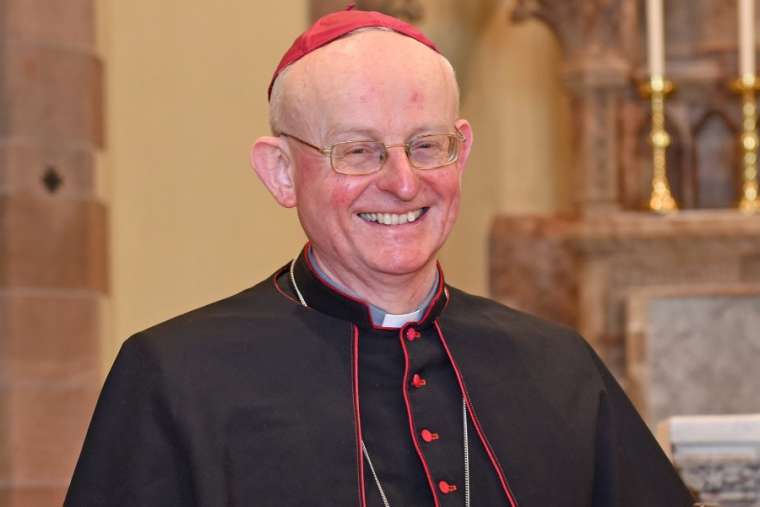Bishop Hugh Gilbert, president of the Bishops’ Conference of Scotland. Credit: Scottish Catholic Media Office.
Public Masses in Scotland resumed today with a maximum number of 50 people permitted to attend regardless of church size.
The Scottish Government permitted public Masses to begin again from July 15, 118 days after they were suspended on March 19 and 11 days after they resumed over the border in England.
Bishop Hugh Gilbert, the president of the Bishops’ Conference of Scotland, told CNA that the 50-person limit would be “irksome for larger churches” but was subject to review.
“It is to be reviewed, I think, at the end of this month. It is certainly a limitation for larger churches,” he said.
The 50-person restriction applies to services at all places of worship, including synagogues and mosques.
Gilbert said Wednesday that Scotland’s Catholics were returning from “a long time in the wilderness.”
“The feeling is a positive one, very much so,” he said.
He noted that while public liturgies were suspended, priests had continued to celebrate Mass without congregations and that thousands of Catholics had followed online via livestreams. But, he said, there was “a weariness that this has gone on and on.”
He recalled that the bishops had engaged in an “intense discussion” with the government in June after it announced that pubs, restaurants, and cinemas could reopen from July 15, but said that churches could not resume public worship before July 23 at the earliest.
He said that alongside with the bishops’ representations, many Catholics wrote to their representatives in the Scottish Parliament. As a result, the government brought forward the date for the resumption of public worship.
Gilbert, the bishop of Aberdeen in northeast Scotland, acknowledged that strict regulations to prevent the spread of the coronavirus meant that not all churches in Scotland could immediately resume public Masses.
Churches were permitted to reopen for individual private prayer June 22, subject to social distancing and strict hygiene requirements.
“The difficulty has been often in the amount of detail involved in reopening churches while observing all the necessary precautions,” he said, explaining that some churches in rural areas had found it difficult to find volunteers to assist with reopening.
The latest government guidance includes a limit of 20 people on weddings and funerals, a requirement to collect worshipers’ contact details in case of an outbreak, and a ban on “singing, chanting and the playing of wind instruments.”
Scotland, which has a population of 5.5 million, has recorded 18,368 infections and 2,490 deaths from the virus as of July 14, according to the Scottish Government.
Gilbert said that the greatest challenge now facing Scotland’s bishops was to draw the Catholic community back to Mass while promoting the unity of the Church. He cited a brother bishop who compared the process to the Gospel story of the miraculous catch of fish, in which the disciples brought a large number of fish on board their vessel without breaking the net.
He said that, while the majority of Catholics accepted the need to suspend Masses to contain the virus, a “vocal minority” objected to the restrictions. He noted that this group had “felt the pain of not being able to receive the sacraments” and that the uncertainty caused by the pandemic was “a very difficult thing for people to pass through.”
“The real challenge is keeping the unity of the Church and bringing people back,” he said.

